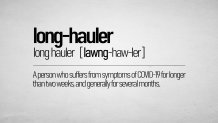Known as COVID-19 “Long Haulers,” some survivors in this pandemic just cannot seem to find relief from the symptoms of the coronavirus. They want answers about what is happening with their health, even months after initially contracting the virus.
Back in March, Caitlin Houston, a mother and blogger from Wallingford was continuously posting on social media about how sick she was. The typically healthy and athletic 35-year-old had tested positive for COVID-19 on April Fools’ Day.
More than seven months later, Houston said she is still dealing with the virus.
"My doctor said, 'You might be one of these long-haul COVID people.' And I'm like 'What is that?'” Houston said.
The phrase “Long Hauler” has become increasingly used to describe COVID-19 survivors who suffer from symptoms even months after their initial illness.

"I still have weird episodes where I'm dizzy out of nowhere or I get these headaches,” Houston said.
Houston said she also lost the senses of taste and smell and that she has had shortness of breath and fatigue for months.
"My biggest fear is that it's going to come back to me and what is it going to do to my body then?” Houston said.
My biggest fear is that it's going to come back to me and what is it going to do to my body then?
Caitlin Houston
These so-called Long Haulers said that their symptoms can be debilitating – and frightening.
"I never thought that I'd be dealing with this right now,” said Vicie Brooks, a retired registered nurse from Hartford. She tested positive for the virus back in April and said she has been dealing with a laundry list of cognitive and physical symptoms ever since.
"I was unable to make a fist with my fingers, as you see here,” Brooks said, trying to clench her fingers into a fist. “This is as far as they go down.”
I never thought that I'd be dealing with this right now.
Vicie Brooks
Brooks said a computed axial tomography (CAT) scan showed she had not suffered a stroke. Now, she does physical therapy at home wondering why the left side of her body is suddenly struggling.
"My muscles in my left arm had atrophied. They actually shrunk,” Brooks said. "I had an excruciating jaw pain - on my left side.
Meanwhile, in East Lyme, former emergency room nurse Louise McLellan said her hair started falling out after her COVID-19 diagnosis.
"It was coming out in clumps. I started taking a couple of supplements for that,” said McLellan. “I do get a lot of joint pain, muscle pain, ear aches."
McLellan said these ailments were not part of her daily life prior to contracting the coronavirus.
“I have never in my life had lung problems,” McLellan said. “Right now, I'm on three inhalers and oxygen."
I have never in my life had lung problems. Right now, I'm on three inhalers and oxygen.
Louise McLellan
Dr. Lauren Ferrante heads up the Yale School of Medicine's Post-COVID-19 Recovery Program, which studies patients with these persistent symptoms. She is also a pulmonary and critical care specialist who cares for patients in the medical intensive care unit (MICU) at Yale New Haven Hospital.
"Patients continue to have impairments in physical function,” said Dr. Ferrante. "Some patients are having trouble with anxiety or depression."
Patients within the program are evaluated by a pulmonologist and physical therapist and are also checked for other symptoms to help identify non-respiratory problems, including neurocognitive changes, behavioral health needs, cardiovascular issues and even sleep problems.
Ferrante said it is still too early to reach conclusions about long-term patient recovery.
"There are many patients who have good days and bad days,” Ferrante said. "For that, we really don't have a good understanding of why that's happening."
"I have patients who are in their 30s and 20s who have the same complaints of persistent shortness of breath that my patients who are in their 70s and 80s have,” said Ferrante. "There doesn't seem to be one age group that ends up with persistent symptoms, nor one race or ethnicity."
“I am extremely interested to find out if there’s a rhyme or reason as to how it affects people because I think that will give me peace of mind and I can sort calm those fears, the anxiety that is just surrounding this virus," Houston said.

